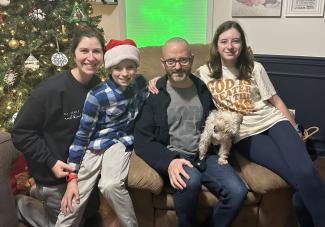At age 37, after experiencing symptoms for two years, Tim was diagnosed with Parkinson’s Disease.
An avid musician, playing the piano was Tim’s first clue that something was wrong. “I started noticing that my right hand was slowing down,” he said. “The slowness and stiffness made it hard to type on the computer as well.” It took two years and four doctors to decipher that the cause was Parkinson’s, so at first, Tim felt somewhat relieved. “At least I knew what it was. Now, how do we fix it?,” he said. The doctors told him that he wouldn’t die from Parkinson’s, but he would die with Parkinson’s. Tim took this to mean that, while there is no cure for this disease, there are many ways to fight the symptoms and live a fairly normal life.
Over the next three years, Tim’s symptoms continued to get worse, and the number of medications he was taking increased. During that time, he became aware of The Cole Center for Parkinson’s & Movement Disorders, part of the Brain & Spine Institute at UT Medical Center. “I was so grateful when friends connected me with Dr. Shadi Barbu and The Cole Center,” Tim said. “Not having to drive three hours to Nashville was a game changer, and I absolutely love Dr. Barbu. She’s one of my favorite doctors ever! She listens to me and my wife and comes up with a plan that meets our goals.”
Tim’s disease – as Parkinson’s normally does – continued to progress. Instead of just his right hand and arm, it was now affecting his right leg and foot as well. By early 2023, Dr. Barbu noticed difficulties in his left side and his speech, too. They continued to combat it with nine pills a day, physical therapy and speech therapy. “One difficulty of being younger with this disease is having the ability to continue working to provide for my family,” Tim said. With a wife and two young kids, that was the driving force behind Tim wanting to pursue even more ways to attack the disease. So, he and Dr. Barbu began to discuss a more serious treatment option: deep brain stimulation, or DBS. This is a brain surgery which allows a small generator placed in the chest to send continuous pulses of electricity to carefully chosen spots in the brain.
This past December, two electrodes were implanted in Tim’s brain by neurosurgeon Carter Gerard, MD and his team. “I can’t believe how smoothly it went,” Tim said. “I stayed just one night in the ICU and was home the next day.” A week later, Tim had a second surgery to place a neurostimulator in his chest.
After the procedures, Tim had several follow-up appointments to fine-tune the electrodes. At each appointment, Dr. Barbu increased the electrical signal and gradually lowered Tim’s medications. “It’s been a process, but I’m now down to just one pill a day,” he said. “It’s incredible already, and I think it’s going to get even better. I’m even working back into my church music teams on the piano and the drums.”
Deep brain stimulation has given Tim hope to fight Parkinson’s for many years to come. “I know the disease is going to get worse over time,” he said, “but it’s incredible to know that Dr. Barbu can continue to adjust the device for years to come without additional surgeries. For anyone struggling with this disease, I’d 100% recommend this procedure at the hands of Dr. Gerard and Dr. Barbu. They provided great care and put us at ease throughout the entire process.”
Thanks for sharing your story, Tim, and we’re so happy you’re back to playing the music you love.
